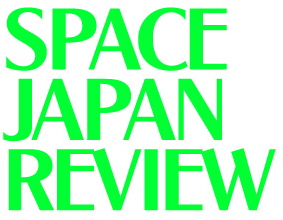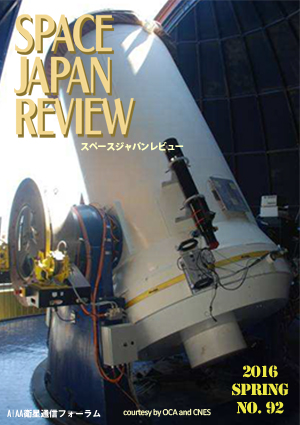
Space Japan Review
No.92, Spring 2016
 OCA-CNES experimental Optical Ground Station on OCA site, near Nice, France courtesy by OCA and CNES |
Cover Page OCA-CNES experimental Optical Ground Station on OCA site, near Nice, France courtesy by OCA and CNES (PDF: 3,675kB) Space Japan Club (in English) Jean-Luc Issler Head of space transmissions department, Centre National d'Etudes Spatiales (CNES) Jean-Luc Issler is head of the Instrumentation, Telemetry & Telecommand and Propagation department of CNES, the French space agency. A graduate of the Ecole Superieure dfElectronique de lfOuest engineering school (ESEO, Angers, France), he has been involved in the development of several spaceborne RF systems in Europe, for transmissions and/or navigation. He has also contributed to CNES research into optical telemetry and related standardization efforts. In 2004 he was awarded the Astronautics Prize of AAAF, the French aeronautical and space association, and in 2008 the EADS science and engineering prize of the French science academy for his work on Galileo signals and space borne GNSS systems. Jean-Luc also wrote an unpublished sci-fi novel in 1990, about the exploration of a Trojan asteroid by a probe with a solar sail. Space Japan Book Review (in English) James Barrat: gOur Final Invention Artificial Intelligence and the End of Human Erah, Thomas Dunne Books, 2013 Dr. Takashi Iida, Editorial Advisor of Space Japan Review This column in the previous issue of Space Japan Review introduced the book about the high speed transaction of stock exchange. At that time, I, the reviewer, would like to review the activity of artificial intelligence (AI) in this field. But I would like to review this book since I am interested in learning the AI itself before that. As the cover of this book is in a mono-tone, it is impressed to be quiet. But the title of this book is very exciting. Although this book does not fan the exciting, there is a risk that mankind would be destroyed, if AI evolves. I understood that it warned anymore it was too late when we noticed it. The satellite communication seems not to concern to the AI, but AI is a basic technology for be applied to any field. I think that this book is appropriate to be taken in this column. However, as I am a layman in AI, it will be difficult to give good description for a whole matters. I would like to challenge as far as possible. This book review will include the reviewerfs personal opinion. It is based on Japanese translation version of this book. Essay #1 (in Japanese) "Pitfalls in Innovation" Katsuya Nakayama, Professor Emeritus of Hiroshima Institute of Technology (PDF: 286kB) Special Report (in Japanese) "Usage of Space Technologies to National Security #2" Norihiro Sakamoto, Space Analyst (PDF: 1,396kB) Space Commentary (in Japanese) "Development of On-board Communication Equipment for Overseas Communication Satellites" Susumu Kitazume, Editorial Advisor of Space Japan Review (PDF: 1,372kB) Education Corner (in Japanese) Space X Israel X I Hiroshi Inose, Tokyo Metoropolitan University, Japan (PDF:378kB) Editorfs Notes |
Editorial Board of Space Japan Review, AIAA JFSC: |
Members of Editorial Board are expecting to have any |
